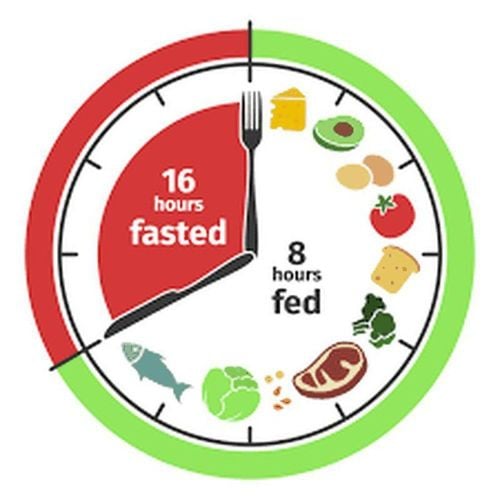This is an automatically translated article.
Surely many people have asked the question: "Does fasting lose weight?". Many studies show that fasting can help people maintain a healthy weight. Although there are many different methods to lose weight, we should adopt lifestyle measures to get in shape and desired weight.1. Does fasting lose weight?
Traditionally, the way to lose weight fast has been to cut calories. Today, however, instead of cutting calories like that, many people are taking harsher steps to reduce their average daily calorie intake by fasting.Fasting means you don't eat for a long time. Fasting is a simple form of eating that helps you get the most out of the calories burned from your body fat. This weight loss method of fasting is often called intermittent fasting, The origin of fasting is rooted in religion. Some faiths, including Islam, Judaism, and Christianity, follow periods of food restriction for spiritual reasons. The researchers found that skipping meals also has a number of health benefits, including weight loss, lower blood pressure and lower blood cholesterol levels.
So, how does fasting help you lose weight? Normally after you eat, your pancreas releases the hormone insulin. The rapid rise in insulin helps move sugar from the blood into the cells to use as energy. Any remaining sugar goes into your muscles or gets metabolized and stored in fat cells as triglycerides. When fasting, insulin levels drop and the body burns stored fat for energy.

Nhiều nghiên cứu cho thấy, nhịn ăn có thể giúp mọi người giữ được cân nặng hợp lý
2. Types of fasting to lose weight
You can fast in a number of different ways including:Alternating day fasting is the most stressful version. You eat nothing and just drink water or a calorie-free drink for one day and then you eat what you want the next day. Alternate fasting alternates between a low-calorie day (about 500 calories) and a normal eating day. The 5:2 diet (also called the Fast Diet) involves eating normally 5 days a week, and then cutting back about 500 calories on 2 other days. Mimic diet, a diet that helps you eat a very low-calorie diet for just a few days and then go back to eating normally. Time-restricted diets focus on the timing of meals. You should only eat for a certain amount of time each day. For example, from 10 am to 6 pm. Then you fast for the rest of the day. There's evidence that alternating fasting with mealtimes will make you lose weight, but not more than if you cut calories. Varady performed a study comparing the effects of alternate-day fasting with calorie restriction in 100 overweight, obese adults. After 1 year, those who alternated fast had lost about 6% of their body weight. The calorie-restricted group lost about 5.3% of their weight. Other studies of alternate-day fasting have shown weight loss of 3% to 8%. Time-restricted feeding results in milder weight loss of about 3% to 4%.

Có bằng chứng đã cho thấy việc nhịn ăn xen kẽ với thời gian ăn uống sẽ khiến bạn giảm cân, nhưng lại không nhiều hơn so với việc bạn cắt giảm lượng calo
3. Other advantages of fasting
Fasting or intermittent fasting has a number of other benefits, aside from weight loss. After you eat, your body is bound to the process of digestion. Taking a break from eating will shift the focus to other areas, like maintaining optimal performance and repairing cellular damage. Fasting gives the body time to heal, because damage in the body doesn't have to be constantly flooded with nutrients and that's good for your health in general.Early research shows that intermittent fasting can help reduce things that can damage the heart, like lower blood pressure, lower blood sugar, and lower blood cholesterol.
Courtney Peterson, a dietitian at the University of Alabama's Nutritional Sciences, studies the impact of intermittent fasting on conditions like diabetes, high blood pressure, and metabolic cardiovascular disease. She said some participants had a drop in blood pressure of 10 to 11 points after exercising. "It's a huge effect. It's the equivalent of a blood pressure-lowering drug."
Most of the health benefits from fasting can be attributed to weight loss, and some people with type 2 diabetes may also benefit. But fasting with type 2 diabetes can be especially dangerous. It's best to consult your doctor before fasting. Intermittent fasting may also slow aging and improve longevity, but so far, the only evidence of this has been from studies in mice, worms, and other animals.

Nghiên cứu ban đầu cho thấy nhịn ăn ngắt quãng có thể giúp giảm bớt những thứ có thể gây hại cho tim
4. How to start fasting to lose weight
Intermittent fasting may need some adjustments. It will take some time for your body to get used to the top-down eating pattern.You may be hungry at first but after about 2 weeks most people get used to fasting. In terms of time, fasting can actually help you control hunger. It may be because blood sugar levels are more stable throughout the day. And time-limited feedings are less likely to induce hunger than intermittent fasting, which could make it more sustainable in the long run.
One way to avoid hunger while fasting is to drink more water. Adding water will also prevent headaches. You also need to change what you eat, having a diet rich in protein from sources like lean poultry, tofu, beans and nuts. That helps maintain muscle mass, because you can lose muscle mass while fasting and also helps you feel fuller for longer.
While many diets allow you to eat what you want during your holidays, don't overeat. You will get the best results if you eat healthy every day.
Although fasting has some benefits, certain groups of people should not fast, including women who are pregnant or breastfeeding. Fasting is also not recommended for some people with diabetes, as it can lower blood sugar to dangerous levels. Avoid fasting if you are recovering from illness or undergoing cancer treatment and you need to maintain or gain weight. This eating style is not suitable for everyone and is not recommended for people with binge eating disorder.
Best if you want to lose weight successfully, in addition to applying a scientific, low-calorie diet, you should also exercise so that excess fat is consumed, thereby making weight loss simpler.

Nếu bạn muốn giảm cân thành công, ngoài việc áp dụng một chế độ ăn uống khoa học, ít calo bạn cũng nên tập thể dục
Currently, Vinmec International General Hospital has implemented general health checks for all subjects and ages. Through blood pressure check, blood test, urine test, liver function, kidney function, clinical examination, imaging diagnosis... the doctor will understand your current health condition to advise on problems. Paying attention helps reduce the risk of disease and is best for health.
Please dial HOTLINE for more information or register for an appointment HERE. Download MyVinmec app to make appointments faster and to manage your bookings easily.
Reference source: .webmd.com - nhs.uk












